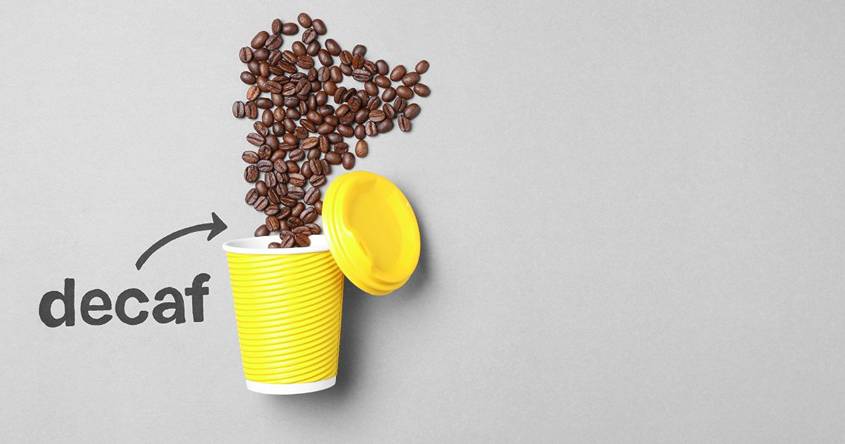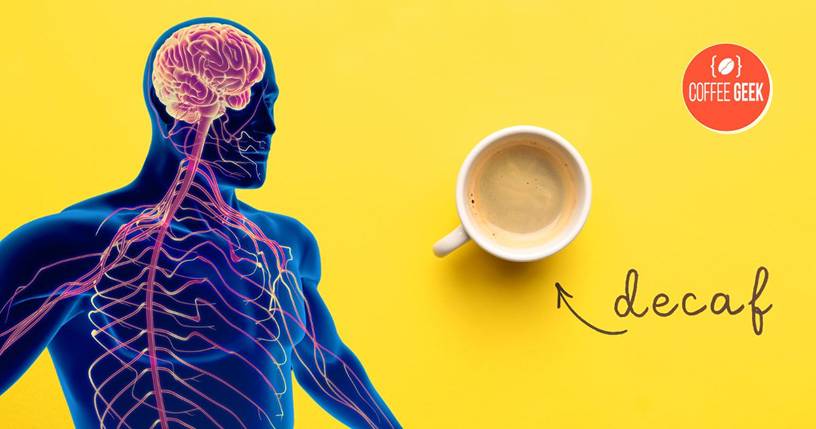Decaf coffee offers the beloved coffee experience without the usual caffeine kick.
Unlike regular coffee, decaf undergoes a process to remove most of its caffeine, making it an ideal choice for those looking to reduce their caffeine intake without sacrificing the taste and warmth of their favorite brew.
Can you get addicted to decaf coffee? Let’s find out in this article.
What is Decaf Coffee and how is it Different from Regular Coffee?
Understanding ‘Decaf’
Decaf, short for decaffeinated coffee, is simply regular coffee from which most of the caffeine has been removed.
Typically, decaf coffee still contains about 2 to 15 milligrams of caffeine per cup, a significant decrease from the 95 to 200 milligrams contained in a regular cup of joe.

This caffeine removal process is usually achieved using chemical compounds or water to strip the coffee beans of their caffeine content.
Difference between Decaf Coffee and Regular Coffee
While decaf coffee and regular coffee are made from the same beans, the main difference lies in one critical compound – caffeine.
Since decaf coffee has the majority of its caffeine removed, it does not stimulate the system of nervous as regular coffee does.
For this reason, regular coffee drinkers often skip the cup of decaf, as it lacks the energizing effects of caffeine.

Impact on Associated Health Risks: Decaf vs Regular Coffee
Health risks associated with both types of coffee are often similar, but a cup of decaf coffee can increase risk factors, like heart disease or osteoporosis, slightly less than regular coffee due to its lower caffeine content.
However, it’s important not to overconsume either drink, as both can contribute to certain health complications when not consumed in moderation.
Can You Get Addicted to Decaf Coffee?
Is ‘Decaf Coffee’ Truly Caffeine-free?
Despite its name, decaf coffee is not completely caffeine-free. A cup of decaf coffee may contain about 2 to 15 milligrams of caffeine.
While this amount is minuscule compared to coffee with caffeine, it might be sufficient to cause persistence in caffeine addiction for sensitive individuals.

The Role of Decaf Coffee in Caffeine Dependence
Caffeine is a stimulant that promotes alertness, hence can be habit-forming.
Taking decaf coffee could potentially prolong caffeine dependence, primarily if used as an alternative by a regular coffee drinker attempting to reduce caffeine intake.
Understanding Emotional Addiction to the Ritual of Drinking Coffee
Beyond the chemical addiction to caffeine, the habit of having decaf coffee could trigger emotional addiction.
The ritual of preparing and consuming a morning coffee, decaf or otherwise, can still activate addictive behaviors and emotional reward pathways.
| Aspect | Description |
|---|---|
| Caffeine Content | Decaf coffee contains a significantly reduced amount of caffeine compared to regular coffee. |
| Addiction Potential | Decaf coffee has very little to no addictive potential due to its low caffeine content. |
| Psychological Dependency | Some individuals may have a psychological dependency on the ritual or taste of coffee, but it is not related to caffeine addiction in decaf coffee. |
| Withdrawal Symptoms | Withdrawal symptoms associated with caffeine addiction are unlikely with decaf coffee consumption. |
| Health Effects | Decaf coffee consumption is generally considered safe in moderation and may even offer some health benefits due to its antioxidants. |
| Individual Variability | Responses to caffeine and coffee consumption vary among individuals, but addiction to decaf coffee is extremely rare. |
Effects of Decaf Coffee on the Nervous System and Overall Health
Decaf Coffee and the Nervous System
Even though decaf coffee is significantly less stimulating due to reduced caffeine levels, the small amount of caffeine in decaf coffee can still lightly influence the system of nervous.
This influence is generally less potent than that of regular coffee, but nonetheless present.

Is there a link between Decaf Coffee and Fatigue?
Some individuals report feeling fatigued after drinking decaf, but it’s generally due to the lack of caffeine rather than the decaf coffee itself.
This feeling often represents caffeine withdrawal symptoms for individuals used to consuming caffeinated coffee.
Can Decaf Coffee contribute to a headache?
Decaf coffee doesn’t commonly lead to headaches, but it might occur due to the withdrawal of caffeine, especially when people stop using caffeinated coffee too quickly.
To avoid such discomfort, it’s advisable to gradually reduce caffeine consumption instead of an abrupt quit.
How to Reduce Caffeine Consumption and Dependence: Alternatives to Decaf Coffee
Although switching to decaf coffee is a good starting point, consuming beverages with even less caffeine amount or entirely caffeine-free options could prove more beneficial in reducing caffeine consumption.
Alternatives such as herbal teas and caffeine-free drinks can be a way to stop using caffeine without the need for decaffeinate coffee.
Common Questions
Is decaf coffee addictive?
While decaf coffee is less addictive than regular coffee due to the lower amounts of caffeine, the science behind shows that it can still be mildly addictive.
This is because decaf coffee still contains some caffeine, albeit in much milder amounts.
Regular consumption of decaf coffee may lead to a mild dependency, but it’s typically nowhere near as severe as drinking regular coffee.

Can I experience caffeine withdrawal if I stop drinking decaf coffee?
Decaf coffee contains very small amounts of caffeine. If you’re used to drinking a lot of it, suddenly stopping might cause some minor withdrawal symptoms such as anxiety and irritability.
However, these effects are usually a lot milder than those experienced when quitting regular coffee.
Is decaffeinated coffee as potentially addictive as a drug?
Decaffeinated coffee can lead to some dependency due to its small caffeine content.
However, it’s not as addictive as psychoactive drugs that directly influence the central system of nervous.
That said, if decaf coffee is consumed in large quantities per day, mild dependency could occur.
Why is some decaf coffee more addictive than others?
This could be down to the flavor. Some brands of decaf coffee like Swiss decaffeinate use a method that allows them to retain more of the coffee’s taste, which could make them more enjoyable and thus more tempting to drink.
Also, instant decaf coffee tends to have a little more caffeine, which could make them more addictive.
What can the adverse effects be of becoming addicted to decaf coffee?
If you become very dependant on decaf coffee, and suddenly stop drinking it, there is a chance you could experience withdrawal symptoms such as an increase in anxiety, irritability, and in some cases, conditions like sleep disturbance.
However, as mentioned before, it’s typically milder than what you’d experience from a caffeine withdrawal.
What can I do to cut back on my intake of decaf coffee if I find it addictive?
If you find yourself developing a dependency, consider switching gradually to a lower caffeine drink such as tea or hot chocolate.
Regulating your diet and getting regular exercise can also be beneficial in reducing cravings.
Another reason might be that it is more of a habit than a need for caffeine, in this case, it might be beneficial to substitute the habit with a healthier one.
Can I substitute my intake of decaf coffee with regular coffee?
Decaf coffee can be a fantastic substitute for regular coffee, especially for those who love the taste of coffee but are sensitive to caffeine.
The consumption of decaf coffee can help keep caffeine levels in check while still enjoying the flavor of coffee.
What do studies show about the addictiveness of decaf coffee?
According to most studies, decaf coffee can potentially lead to a mild form of addiction, although it is unlikely to be severe.
This is due to the small quantities of caffeine still present in the coffee.
So, while it can feed a caffeine craving, it is not usually significant enough to cause serious withdrawal symptoms or health conditions.
Does decaf coffee have any other benefits apart from being less addictive?
Decaf coffee can be a good source of antioxidants just like regular coffee.
It’s a healthier option for those with conditions like anxiety, who can be sensitive to caffeine.
Lastly, some people may want to enjoy the social aspect of drinking coffee without the stimulating effect, hence decaf is a good choice.
Can the addictiveness of decaf coffee affect my shopping habits as an Amazon associate?
As an Amazon associate, you can earn from qualifying purchases of decaf coffee.
If you find yourself becoming addicted to decaf coffee, you may be inclined to buy more of it, which could technically impact your shopping habits.
However, it’s worth noting that the dependence on decaf coffee is usually much milder, so any impact would likely be minor.

